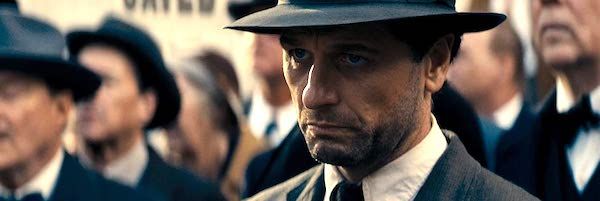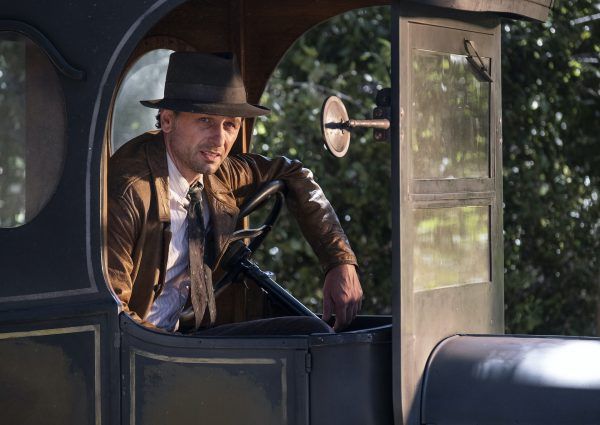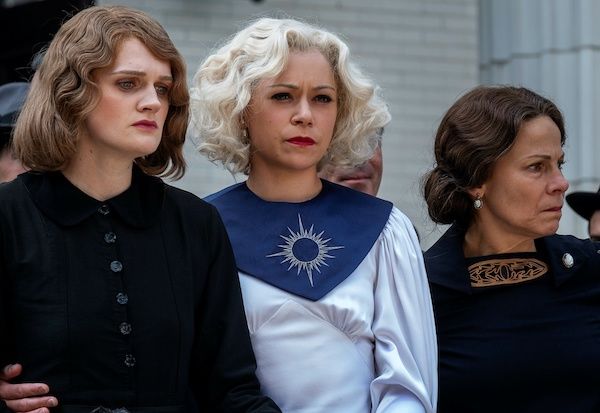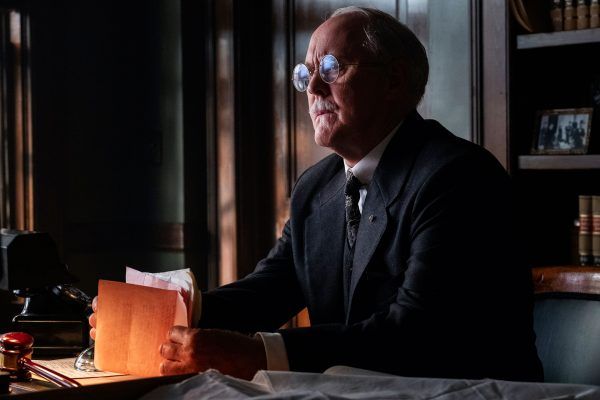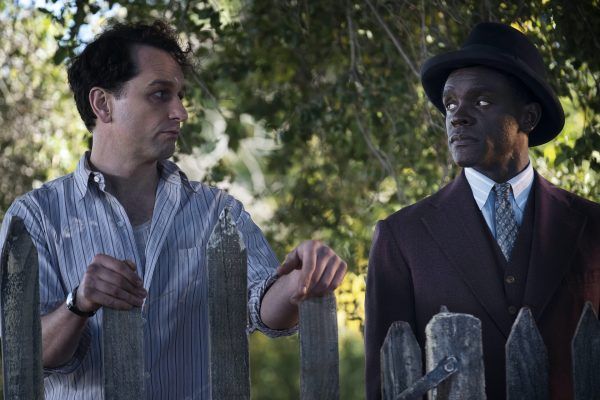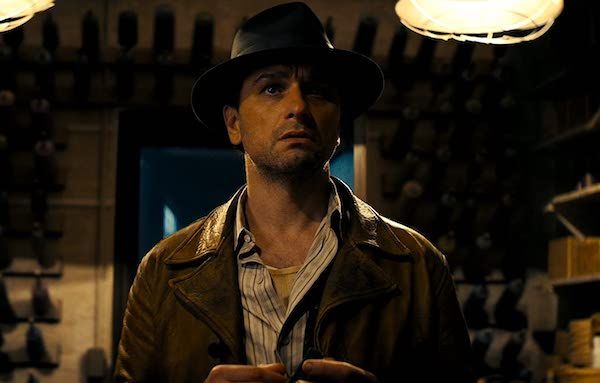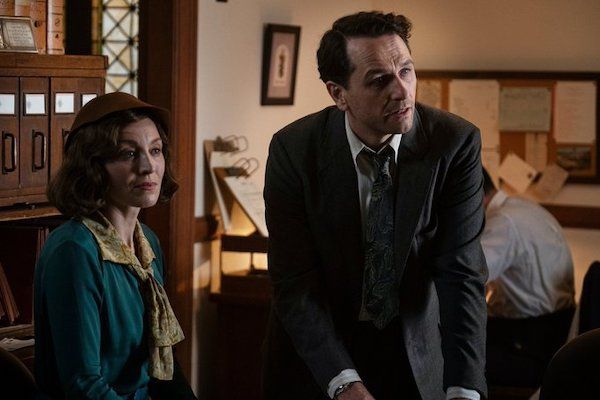From showrunners Ron Fitzgerald & Rolin Jones, and executive produced by Robert Downey Jr. & Susan Downey, the HBO series Perry Mason, which has already been renewed for Season 2, is set in 1931 Los Angeles with Perry Mason (Matthew Rhys) as a private investigator struggling to make ends meet. When the case of a kidnapped infant with a $100,000 ransom comes his way, Mason turns to his right-hand man Pete Strickland (Shea Whigham), attorney E.B. Jonathan (John Lithgow) and E.B.’s legal secretary, Della Street (Juliet Rylance), for help in answering the growing list of questions surrounding the crime.
During this 1-on-1 phone interview with Collider, Fitzgerald and Jones (both are also executive producers and writers on the series) open up about the journey Perry Mason took to this iteration, making this version much more Chinatown than Law & Order, the fun in creating a backstory for the familiar character, the collaborative relationship they have with Rhys, and having 87 Perry Mason novels to pull from for future seasons.
COLLIDER: Getting the show to the screen has been a journey, as most projects are. It’s gone from a film to now a TV series. How did this project come your way?
ROLIN JONES: There was the movie, and then the first crack at it for HBO. Then, they did the usual and called [the agencies]. It came down the pike that someone was thinking of doing Perry Mason, and I’m sure myself and Ron [Fitzgerald] had the same reaction of, “Why?!” But then, we actually sat down with the Downeys, and what they were talking about and where they had gone sounded like it was worth exploring. Then, we read that the novels and were like, “Whoa, these are very different than the ‘50s television show that we knew from being a kid and watching reruns.” Fitz is a big noir fan, and I’m a native Angeleno and really into the history of the town. There was enough there to say, “Do you wanna spend a year of your life on this?” And two and a half years later, it’s been a journey. But there was enough there, the timing was right, the people were right, and it all worked out.
It’s an interesting project because when you say the name Perry Mason, people think they know what that is, but then they realize they know the name more than they know the show. Did it feel that way for you, and is there a freedom in that?
RON FITZGERALD: Yeah, a hundred percent. The first thing I thought of was Raymond Burr in black and white, my grandmother watching it, and someone cracking on the stand every week, and saying, “You got me. It was me, all along.” It was Scooby-Doo for adults. But that’s me sitting here in 2020 looking back on it. But at the time, it established Law & Order and the courtroom drama. It was groundbreaking, at the time they were doing it, so I understand why people have such love and reverence for it.
For me and for Rolin, when we came into it, we were like, “Well, we don’t wanna do that. There’s no need to do that. It’s been done really, really well with Raymond Burr. So, what can we do? What do we wanna do, if we’re gonna take this journey on?” And then, we went back and looked at the novels and were like, “Wait a minute, this is 1933 that the first novel is set in, and he’s never in the courtroom. He’s out doing stuff, all the time. This is a different dude. This is a Sam Spade kind of guy.” It was exciting to realize that we could be true to the source material and head in a direction that’s much more Chinatown than Law & Order.
Since you really are only confined by what you can do within the time period, what details did you most enjoy creating about Perry Mason’s backstory for this?
JONES: The word "enjoy" is an interesting thing. It was a lot of trips back and forth to the bar going, “How about this?” There is the burden of doing something that Erle Stanley Gardner was not particularly interested in doing himself, which was the background and character development for Perry Mason. Perry Mason was a delivery system for some very sophisticated plotting and mystery cracking. So, you go in there with religious trepidation, and then you start digging in and having some fun. We went out to talk to some old-timey detectives and lawyers from Ventura County, where Erle Stanley had his initial law practice and then wrote all his books. We were trying to get a vibe, and we read a biography about him. And then, we used the books and the dogmatic things that Perry Mason would say about truth and justice, that are scattered throughout the book. We used those as tentpoles for how that guy would come around to that idea about things. You graft that onto what’s going on in the city then and what would be dramatic over eight episodes. I never know if it ever really approaches joy, but it’s good work. It’s good, fun work, in that way.
FITZGERALD: It was fun figuring out that he lives on a dairy farm that has an airport being built around it. Having somebody like Virgil be his buddy at the morgue was a lot of fun. Having Pete Strickland and digging that out of an old Erle Stanley Gardner story that he’d written for some detective magazine was a lot of fun. Taking a character like Paul Drake, who was just the guy that did everything that Perry Mason didn’t want to do, and then comes back and tells him about it, and having him be a Black cop was interesting. Same thing with Della. What if Della is not just always going, “Gosh, Perry, how are you gonna get out of this jam?” but was actually a person. That stuff was a lot of fun. And L.A., at this time, was just fun. It wasn’t necessarily part of the backstory, but it was part of our process to think of characters who had survived a world war, the influenza epidemic, and the Depression time, and they weren’t into naval gazing. They were tough. They were a lot tougher than I am, today, for sure. They just smiled through a lot of trouble, and they always found a little bit of humor, fun, and lightness, despite the hard things that they were going through, which relative to what I go through, isn’t anything, really.
Perry Mason is a man who wears a hat, and when you have a character that’s known for wearing a hat, you want to get the hat right. What was that process like, and how did you know when you had the right hat?
JONES: I like your romantic idea that a writer can get in between an actor and his hat, or a costume designer. That was a beautiful tango dance between Emma [Potter] and Matthew [Rhys]. It’s a very personal thing, an actor and his hat. It’s very, very private. You don’t wanna get near it. It’s like staring into your neighbor’s window. It’s better not knowing why or how. It’s a good hat, though.
You not only have Matthew Rhys stepping into this role, but he’s also a producer on the series, which means you guys are dealing with him, talking to him and getting his input a lot more. What was it like to collaborate with him and establish that relationship between you guys?
FITZGERALD: It was great. From the first meeting we had with Matthew, all of us sitting down together and having a few drinks, we vibed, right off the bat. We told him about the ideas we had for where we wanted to go with Perry Mason, and it was definitely gonna be dark. He knew that and was into that. Rolin and I both have theater backgrounds, and we’re used to working with our actors when you’re building something, so it was really natural for both of us. We were like, “What you don’t need to say, you can just get rid of it and act it.” That was all very natural, especially with a guy like Matthew, who is probably the nicest number one you could have on a call sheet. The guy is just a really amazing, hard-working dude.
JONES: It’s a super boring answer, but it’s true. He’s a really great collaborator and a lot of fun. He’s a gentleman. It’s annoying. It’s really annoying. I wish we could tell you about some knife fights, or the time I threw a bowling ball at him, but that didn’t happen. He’s just a fucking dreamboat. It’s very aggravating to have somebody that involved in your life, all the time. There was no drama.
When you tell everyone that this is the origin story for the character, it gives a sense that there’s more story to tell. Had you always had a bigger plan for the character? Do you already have a plan for Season 2?
JONES: There’s definitely a plan. We’ve got 87 books that we can dive into and take whatever we need from. There is plenty of future out there for Perry Mason, should the gods of HBO financing be so inclined to give us that opportunity. There’s plenty there. I think we’re just scratching the surface with a lot of stuff. There’s a lot to do.
FITZGERALD: We just tried to get the super friends – Della, Paul, and Perry – together. I assume, with all sorts of workplace beginnings, there will be tensions. You’ve gotta figure some stuff out when you’re all suddenly sharing space and sharing cases together. There are 87 fucking novels. That’s a lot.
Does it make the storytelling easier or harder, when your characters can’t rely on or use fancy amenities and technology? They don’t have cell phones and computers. They just have to go out and do the legwork.
FITZGERALD: It’s dreamy. It’s the best thing, ever.
JONES: Google is gone.
FITZGERALD: Google was the death of noir.
JONES: You’re like, “Let’s do a Google search. What’s the guy’s name? Let me log online and get a report on him, right now.” It’s great. I loved it. I loved not having to have a computer anywhere in it.
FITZGERALD: Obstacles are fabulous.
When you’re the showrunner of a TV series, you get all of the credit and you also get all of the blame, and everyone looks to you for the answers to every question, whether you have them or not. What was it like, the first day that you walked onto a set of showrunners, and what made you realize that it was something that you were good with doing?
JONES: Alcohol, I guess.
FITZGERALD: By the time you’re on set, when you’re actually turning on lenses, there’s like a hundred showrunners, if you’re really honest with yourself. There are so many people who’ve done so much intricate, beautiful, detailed work, and you just have to get the fuck out of the way and let them do their work. You can be there, just in case there’s an absence or a void, or something like that, but if everybody’s done their job, hand it over to (director) Tim [Van Patten], hand it over to your designers, and hand it over to your actors, and let them be as free as you were when you were writing it. It’s super collaborative. You’re not writing a novel, a poem, or a piece of music. It’s an art form that really takes a bunch of fucking people at the table to make it work. That part is super humbling, quite moving, and really, really cool.
You go down to San Pedro and they have completely transformed it into 1931, and you look at every little inch of it and you’re blown away by how much beautiful, lovely, thoughtful work has been put in. Hire talented people who work just as hard at figuring out their job, as you did on yours, and then get out of the way. Micro-managing artists is the death of everything. It’s just so dumb and so bad. Just drop your ego at the fucking door and be excited by all of the lovely things that come forth. Who wants to watch those end credits at the end, but there’s a bazillion names, and every single one busted their ass for it. The precious words that you typed on your blank piece of paper, aren’t gonna do anything. They’re gonna sit there like dogs if you’ve gotten in the way of those people that are there to elevate all that stuff. You make a map, and everyone tries to follow it a little bit, but it takes everybody.
Aside from the show being absolutely gorgeous to look at, this cast is fantastic. What did you enjoy most about watching these actors interpret their characters and bring them to life?
FITZGERALD: That’s a really hard question. Watching them discover the relationships between each other was great. It’s one thing to sit down with somebody and talk to them about Sister Alice or Paul Drake or Perry Mason. You can have those conversations, and those are very intellectual and heady, but you can feel confident. You’re never going, “Hey, is Matthew Rhys gonna do a good job?” Of course, he’s gonna do a good job. There’s just so much that happens between the characters that aren’t typed. That’s the coolest thing to watch.
JONES: I remember walking into the court and going, “Oh, look, there’s Matthew Rhys. Look, there’s John Lithgow. Look, there’s Stephen Root. Wait, our judge is Max Headroom.” You start losing your mind, wondering what’s going on and how any of this happened to you. It’s pretty cool.
The Perry Mason Season 1 finale airs on Sunday, August 9 at 9/8c on HBO.
Christina Radish is a Senior Reporter of Film, TV, and Theme Parks for Collider. You can follow her on Twitter @ChristinaRadish.

